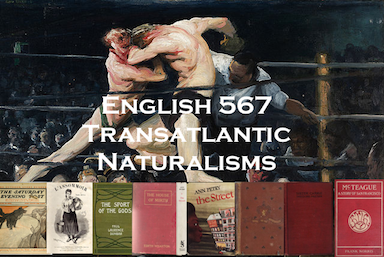 |
English 567, Seminar in Prose Fiction: Transatlantic
Naturalisms
Fall 2015, Thursdays 2:50-5:20,
Avery 104
Donna
Campbell
campbelld@wsu.edu
Avery 202H
Course blog: http://transatlanticnaturalisms.wordpress.com
Course materials available at http://www.wsu.edu/~campbelld/engl567/index.html
English 567 explores late nineteenth and twentiethcentury literary naturalism, a movement based in evolutionary science and praised for its commitment to truth and objectivity by its practitioners but condemned as sordid and shocking by its detractors. This version of the course pays particular attention to naturalistic works by women writers and writers of color from the United States, England, France, Spain, and Brazil. |
• Fictions of the body; subjectivity and consciousness; evolution; biological and hereditary traits, including problematic theories of race and ethnicity; atavism, disease, and degeneration; sexuality and its various expressions; primitivism and emotional excess.
• Constructions of the city and its crowds: the city as organism; bodies en masse, including mobs, crowds, and crowd psychology; the urban jungle; Social Darwinism
• Concepts of space and the environment, including built and natural environments; prisons and entrapment; the function of material objects and processes; the antiromantic indifference of nature; human beings as both destroying and being destroyed by nature.
• Commodity and consumer culture: the desiring self; commodity fetishism; department stores, advertising, and the role of text in constructing subjectivity.
• Technology and machine culture: the body as machine (Seltzer); machines and corporations as bodies (Michaels); the powers of technology, including industrial capitalism.
• Theories of scientific and philosophical determinism; the real, the “true,” and the “accurate”; philosophical coherence and emotional logic; naturalistic representation and its critics.
• Narration and genre: “objective” representation; the spectator; features of style and form (e.g., the naturalistic catalogue of decay).
• Gambling, speculation, risk and risky behavior; the vagaries of fate and accident and their relation to determinism; impulse and restraint.
Primary texts for this class will include work from among the following authors:
- Frank Norris, McTeague (Norton, 1997) 9780393970135
- Edith Wharton, The House of Mirth (Broadview, 2005) 978-1551115672
- Kate Chopin, The Awakening (Norton) 9780393960570
- Paul Laurence Dunbar, The Sport of the Gods (Modern Library) 9780812972795
- Thomas Hardy, Tess of the D'Urbervilles (Norton, 1991) 9780393959031
- Jack London, selected stories (handouts)
- Stephen Crane, Maggie, a Girl of the Streets (Broadview, 2006) 9780553213553
- Emile Zola, L'assommoir (Oxford World Classics) 9780199538683
- Theodore Dreiser, Sister Carrie (Norton, 2006) 9780393927733
- Ann Petry, The Street (Mariner Books) 9780395901496
- Emilia Pardo Bazan, Torn Lace (MLA) 978-0873527842
Critical and theoretical readings include work by Eric Carl Link, Mary Papke, Gillian Beer, Donald Pizer, Jennifer Fleissner, Janet Beer, Katherine Joslin, Jeanne Campbell Reesman, Mark Seltzer, Walter Benn Michaels, and Gene Andrew Jarrett.
Assignments are all geared toward eventual presentation or publication. They include a 30-minute oral presentation; short 5-minute presentations of critical material; and two papers, one of conference length and one longer paper that may be based on the same topic.
